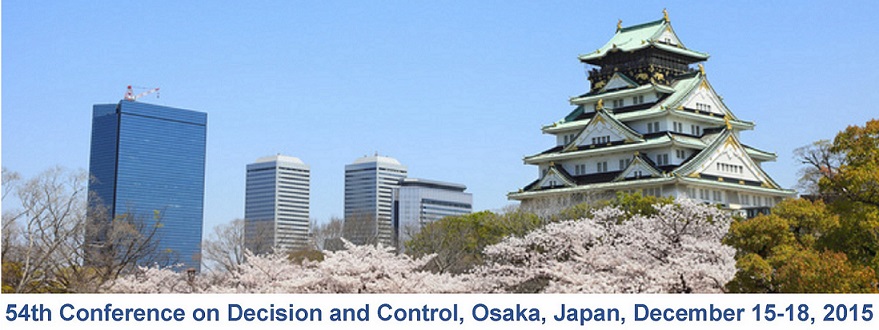|
Sponsoring Organizations
Your IP: 216.73.216.93
Unique visitors: 120484
Total Page views:46926
(Since April 15th, 2014)
|
| |
|
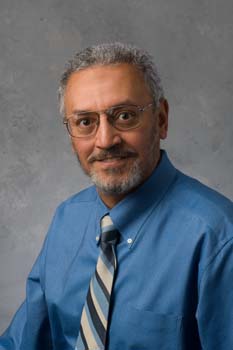 Hassan K. Khalil,
Department of Electrical & Computer Engineering,
Michigan State University, East Lansing.
Hassan K. Khalil,
Department of Electrical & Computer Engineering,
Michigan State University, East Lansing.
Bode Lecture Title:
High-gain Observers in Nonlinear Feedback Control
Friday, 11:00-12:00pm, Large Hall
Abstract:
High-gain observers play an important role in the design of feedback control for nonlinear systems. This lectures overviews the essentials of this technique. After a brief historical background, a motivating example is used to illustrate the main features of high-gain observers, with emphasis on the peaking phenomenon and the role of control saturation in dealing with it. The use of the observer in feedback control is discussed and a nonlinear separation principle is presented. The use of an extended high-gain observer as a disturbance estimator is covered. Challenges in implementing high-gain observers are discussed, with the effect of measurement noise as the most serious one. Techniques to cope with measurement noise are presented. The lecture ends by listing the speaker's experience with experimental testing of high-gain observers.
Biography:
Hassan K. Khalil received the B.S. and M.S. degrees in electrical engineering from Cairo University, Egypt, in 1973 and 1975, respectively, and the Ph.D. degree from the University of Illinois, Urbana-Champaign, in 1978, all in electrical engineering.
Since 1978, he has been with Michigan State University (MSU), where he is currently University Distinguished Professor of Electrical and Computer Engineering. He has consulted for General Motors and Delco Products, and published several papers on singular perturbation methods and nonlinear control. He is the author of Nonlinear Control (Pearson 2015), Nonlinear Systems (Macmillan 1992; Prentice Hall 1996 & 2002) and coauthor of Singular Perturbation Methods in Control: Analysis and Design (Academic Press 1986; SIAM 1999).
Dr. Khalil was named IEEE Fellow in 1989 and IFAC Fellow in 2007. He received the 1989 IEEE-CSS George S. Axelby Outstanding Paper Award, the 2000 AACC Ragazzini Education Award, the 2002 IFAC Control Engineering Textbook Prize, the 2004 AACC O. Hugo Schuck Best Paper Award, the 2009 AGEP Faculty Mentor of the Year Award, and the 2015 IEEE-CSS Bode Lecture Prize. At MSU he received the 1983 Teacher Scholar Award, the 1994 Withrow Distinguished Scholar Award, and the 1995 Distinguished Faculty Award. He was named University Distinguished Professor in 2003. He served as Associate Editor of the IEEE Transactions on Automatic Control, Automatica, and Neural Networks, and as Editor of Automatica for nonlinear systems and control. He was Registration Chair of the 1984 CDC, Finance Chair of the 1987 ACC, Program Chair of the 1988 ACC, and General Chair of the 1994 ACC.
|
| |
| |
|
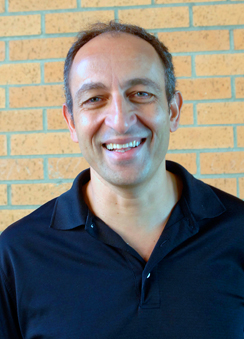 Munther A. Dahleh,
Department of Electrical Engineering and Computer Science,
Massachusetts Institute of Technology, Cambridge, MA.
Munther A. Dahleh,
Department of Electrical Engineering and Computer Science,
Massachusetts Institute of Technology, Cambridge, MA.
Plenary Title:
Fragility of Networked Systems
Tuesday, 8:30-9:30am, Large Hall
Abstract:
The emergence of large networked systems has brought about new challenges to researchers and practitioners alike. While such systems perform well under normal operations, they can exhibit fragility in response to certain disruptions that may lead to catastrophic cascades of failures. This phenomenon, referred to as systemic risk, emphasizes the role of the system interconnection in causing such, possibly rare, events. The flash crash of 2010, the financial crisis of 2008, the New England power outage of 2003, or simply extensive delays in air travel, are just a few of many examples of fragility and systemic risk present in complex interconnected systems.
Robust interconnections have been the subject of study by the control community for several decades. Substantial progress has been made in the context of both stability and performance robustness for various types of interconnections. Typical problems addressed in the literature involve interconnections with simple topologies, but with more complex components (dynamic, sometimes with high dimensions).
More recently, the attention of the research community has shifted towards networked systems where the topology of the network is fairly large and complicated, while the local dynamics are fairly simple. The term fragility is used in this context to highlight the system's closeness to failure. Notions of failure include large amplification of local disturbances (or shocks), instability, or a substantial increase in the probability of extreme events. Cascaded failures, or systemic risk, fit under this umbrella and focus on local failures synchronizing to cause a breakdown in the network. Many abstracted models from transportation, finance, or the power grid fit this framework well. The focus of research is to relate fragility to the size and characteristics of a network for certain types of local interactions.
In this talk, I will address this emerging area. I will provide some constructive examples and highlight important research directions.
Biography:
Munther A. Dahleh received his Ph.D. degree from Rice
University, Houston, TX,
in 1987, in Electrical and Computer Engineering. Since then, he has been
with the Department of Electrical Engineering and Computer Science, MIT,
Cambridge, MA, where he is now the William A. Coolidge Professor of EECS. He is currently the acting director of the Engineering Systems Division, and Director-designate of a new organization addressing major societal problems through unification of the intellectual pillars in Statistics, Information and Decision Systems, and Human and Institution Behavior. Previously, he held the position of Associate Department Head of EECS. He has been a visiting Professor at the Department of
Electrical Engineering, California Institute of
Technology, Pasadena, CA, for the Spring of 1993. He has consulted for various national research laboratories and companies.
Dr. Dahleh is interested in Networked Systems with applications to Social and Economic Networks,
Transportation Networks, and the Power Grid. Specifically, he focuses on the development of foundational
theory necessary to understand, monitor, and control systemic risk in interconnected systems.
His work draws from various fields including game theory, optimal control, distributed optimization,
information theory, and distributed learning. His collaborations include faculty from all five schools at MIT.
Dr. Dahleh is the co-author (with Ignacio Diaz-Bobillo) of the
book Control of Uncertain Systems: A Linear Programming Approach,
published by Prentice-Hall, and the co-author (with Nicola Elia)
of the book Computational Methods for Controller Design published by
Springer. He is the three times recipient of the George Axelby outstanding
paper award for best paper in IEEE Transactions on automatic control. He is also
the recipient of the Donald P. Eckman award
from the American Control Council in 1993 for the best control engineer under 35.
He has given many keynote lectures at major conferences.
|
|
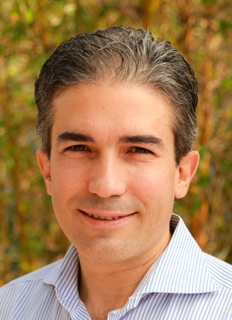 Francesco Bullo,
Department of Mechanical Engineering,
University of California, Santa Barbara.
Francesco Bullo,
Department of Mechanical Engineering,
University of California, Santa Barbara.
Plenary Title:
Network Systems in Science and Technology
Wednesday, 8:30-9:30am, Large Hall
Abstract:
Network systems are mathematical models for the study of cooperation,
propagation, synchronization and other dynamical phenomena that arise among
interconnected agents. Network systems are widespread in science as they
are fundamental modeling tools, e.g., in sociology, ecology, and
epidemiology. They also play a key growing role in technology, e.g., in the
design of power grids, cooperative robotic behaviors and distributed
computing algorithms. Their study pervades applied mathematics.
This talk will review established and emerging frameworks for modeling,
analysis and design of network systems. I will survey the available
comprehensive theory for linear network systems and then highlight selected
nonlinear concepts. Next, I will focus on recent developments by my group
on (i) modeling of the evolution of opinions and social power in social
networks, (ii) analysis of security and transmission capacity in power
grids, and (iii) design of optimal strategies for robotic routing and
coordination.
Biography:
Francesco Bullo is a Professor with the Mechanical Engineering Department
and the Center for Control, Dynamical Systems and Computation at UC Santa
Barbara. He was previously associated with the University of Padova, the
California Institute of Technology and the University of Illinois at
Urbana-Champaign. His main research interests are network systems and
distributed control with application to robotic coordination, power grids
and social networks. He is the coauthor of "Geometric Control of
Mechanical Systems" (Springer, 2004) and "Distributed Control of Robotic
Networks" (Princeton, 2009). His articles received the 2008 IEEE CSM
Outstanding Paper Award, the 2010 Hugo Schuck Best Paper Award, the 2013
SIAG/CST Best Paper Prize, and the 2014 Automatica Best Paper Award. He is
currently serving as Chair of the Mechanical Engineering Department at UCSB
and has served as Vice-President for Technical Activities and for
Publications for the IEEE Control Systems Society.
|
|
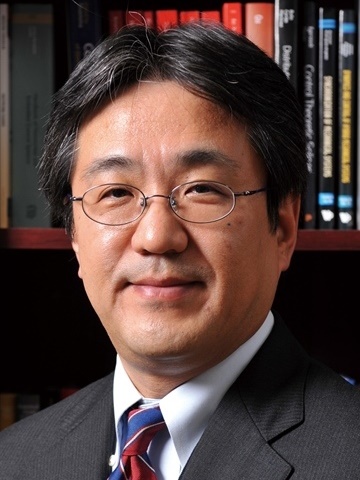 Masayuki Fujita,
Department of Mechanical and Control Engineering,
Tokyo Institute of Technology, Japan.
Masayuki Fujita,
Department of Mechanical and Control Engineering,
Tokyo Institute of Technology, Japan.
Plenary Title:
Distributed Energy Management Systems toward Smart Cities: International Research Collaboration
Thursday, 8:30-9:30am, Large Hall
Abstract:
In the interim report on the fifth Science and Technology Basic Plan of Japan, the realization of Super Smart Society in our future is highlighted. The initiative for Smart Cities has been also promoted worldwide as societal-scale CPS (Cyber-Physical Systems) infrastructures. Along with efficient traffic/water/security management, distributed EMS (Energy Management Systems) should play a key role as we head toward low carbon environmental friendly society that is essential for sustainable development. To this goal, JST (Japan Science and Technology Agency) has launched a CREST research area for the distributed EMS building. The aim of this project is to create fundamental theory and advanced technology for optimal control of energy balancing between dynamic demand and supply. The topics covered include forecast and integration of renewable energy, management of electric vehicle/storage, demand response and human behavior, development of demand model, and platform building. A particular emphasis is on the promotion of international research collaboration with the US and European Funding Agencies, such as NSF (USA), DFG (Germany), RCN (Norway), CNR (Italy) and others. This would enable all the project researchers involved to catalyze networking and knowledge sharing with a broad array of disciplines. In this talk, the on-going exciting progress of the CREST EMS project will be presented.
Biography:
Masayuki Fujita is a Professor with the Department of Mechanical and Control Engineering at Tokyo Institute of Technology. He is also a Research Supervisor for Japan Science and Technology Agency (JST) Core Research for Evolutional Science and Technology (CREST). He received Dr. of Eng. degree in Electrical Engineering from Waseda University, Tokyo, in 1987. Prior to his appointment at Tokyo Tech, he held faculty positions at Kanazawa University and Japan Advanced Institute of Science and Technology. His research interests include passivity-based control and estimation in robotics and vision, distributed energy management systems, and robust control with its industrial applications. He is the coauthor of the books "Passivity-Based Control and Estimation in Networked Robotics" (Springer) and "Introduction to Feedback Control" (in Japanese, more than 45,000 copies). He is a recipient of the 2008 IEEE Transactions on Control Systems Technology Outstanding Paper Award. He also received the SICE Education Award and the Outstanding Paper Awards from SICE and ISCIE. He was the IEEE CSS Vice President Conference Activities, a member of IEEE CSS Board of Governors, and the General Chair of the 2010 IEEE Multi-conference on Systems and Control. He was also the Head of SICE Technical Division on Control, the Chair of SICE Technical Committee on Control Theory, and the Director of SICE. He has served/been serving as an Associate Editor for IEEE Transactions on Automatic Control, IEEE Transactions on Control Systems Technology, Automatica, Asian Journal of Control, and an Editor for SICE Journal of Control, Measurement, and System Integration.
|
| |
|
Key dates (2015)
| Submission Site Opens: | January 5 |
Invited Session
Proposals Due: | March 12 |
| Initial Submissions Due: | March 24 |
| Workshop Proposals Due: | May 1 |
| Decision Notification: | End of July |
| Registration Opens: |
August 12 |
| Final Submissions Due: |
September 15, 2015
September 17, 2015 |
Corporate Sponsors
Platinum Sponsor
Gold Sponsor
Silver Sponsors
Bronze Sponsors
Stationery Sponsor
|
